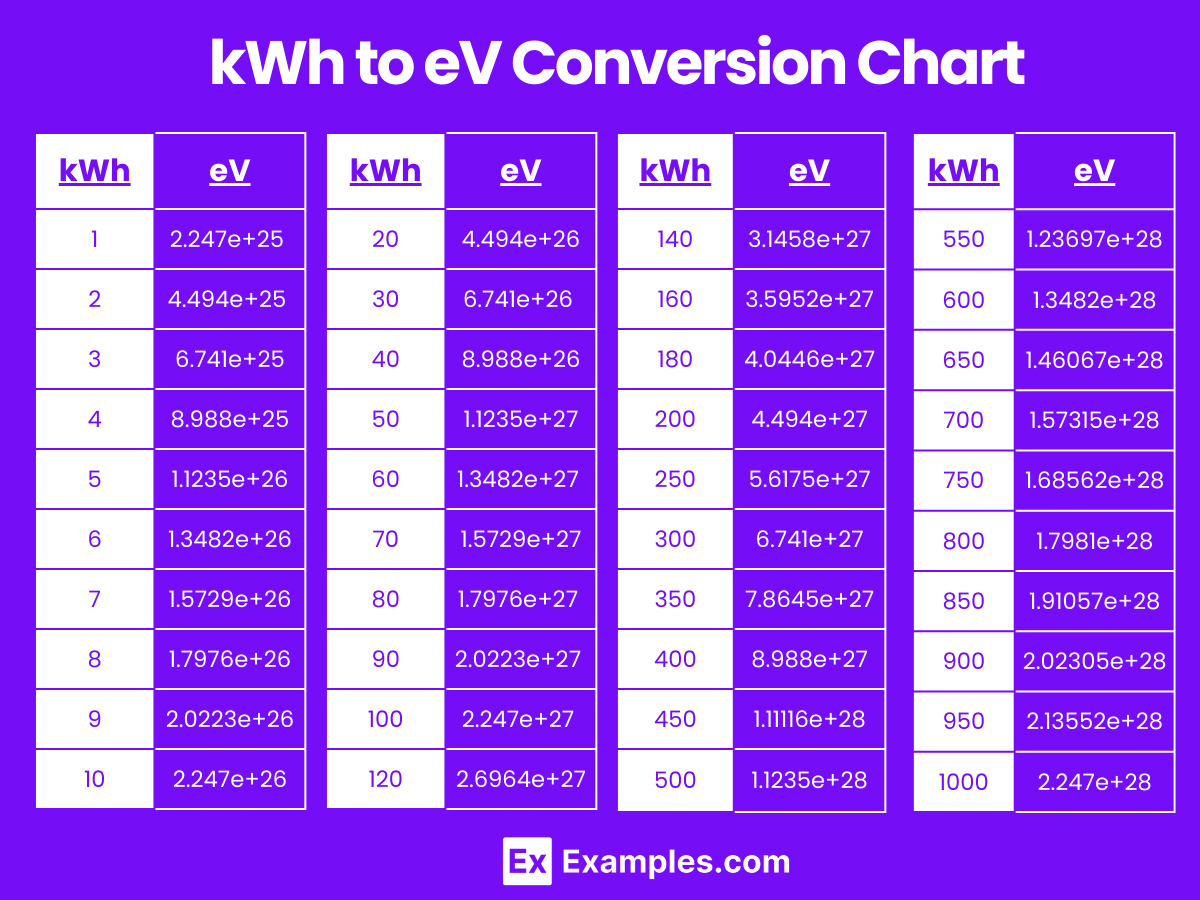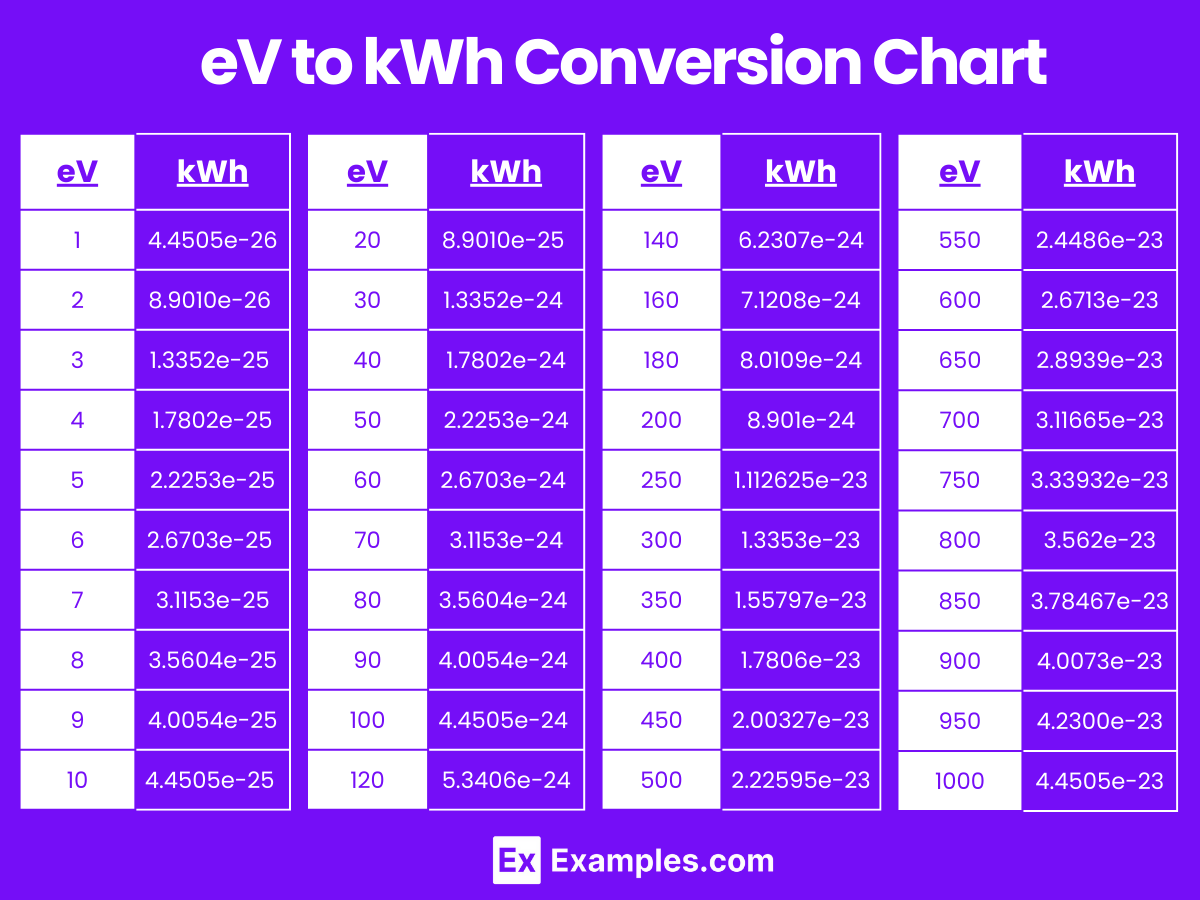Effortlessly convert Kilocalories to Watt-hours and vice versa using intuitive tools at examples.com. Save time and ensure accurate energy conversions!
kWh to eV
Formula: Energy in Electronvolts (eV) = Energy in Kilowatt-hours (kWh) x 2.247e+25
Kilowatt-hour :
Electronvolt :
| Kilowatt-hours | Electronvolts |
|---|---|
| 1 | 2.247e+25 |
eV to kWh
Formula: Energy in Kilowatt-hours (kWh) = Energy in Electronvolts (eV) ÷ 2.247e+25
Electronvolt :
Kilowatt-hour :
| Electronvolts | Kilowatt-hours |
|---|---|
| 1 | 4.4503782821539825e-26 |
Energy Converters to Kilowatt-hour
Energy Converters to Electronvolt
Conversion Factors
- Kilowatt-hour to Electronvolt : 1 kilowatt-hour (kWh) = 2.247e+25 electronvolts (eV)
- Electronvolt to Kilowatt-hour : 1 electronvolt (eV) = 1 / 2.247e+25 kilowatt-hours (kWh)
How to Convert Kilowatt-hour to Electronvolt
To convert kilowatt-hours to electronvolts, multiply the number of kilowatt-hours by 2.247e+25.
Electronvolts=Kilowatt-hours×2.247e+25
Example:
Convert 5 kilowatt-hours to electronvolts.
Electronvolts=5×2.247e+25=1.1235e+26 eV
How to Convert Electronvolt to Kilowatt-hour
To convert electronvolts to kilowatt-hours, divide the number of electronvolts by 2.247e+25.
Kilowatt-hours=Electronvolts/2.247e+25
Example:
Convert 4e+26 electronvolts to kilowatt-hours.
Kilowatt-hours=4e+26/2.247e+25=17.8 kWh
Kilowatt-hour to Electronvolt Conversion Table
| Kilowatt-hour (kWh) | Electronvolt (eV) |
|---|---|
| 1 kWh | 2.247e+25 eV |
| 2 kWh | 4.494e+25 eV |
| 3 kWh | 6.741e+25 eV |
| 4 kWh | 8.988e+25 eV |
| 5 kWh | 1.1235e+26 eV |
| 6 kWh | 1.3482e+26 eV |
| 7 kWh | 1.5729e+26 eV |
| 8 kWh | 1.7976e+26 eV |
| 9 kWh | 2.0223e+26 eV |
| 10 kWh | 2.247e+26 eV |
| 20 kWh | 4.494e+26 eV |
| 30 kWh | 6.741e+26 eV |
| 40 kWh | 8.988e+26 eV |
| 50 kWh | 1.1235e+27 eV |
| 60 kWh | 1.3482e+27 eV |
| 70 kWh | 1.5729e+27 eV |
| 80 kWh | 1.7976e+27 eV |
| 90 kWh | 2.0223e+27 eV |
| 100 kWh | 2.247e+27 eV |
kWh to eV Conversion Chart

Electronvolt to Kilowatt-hour Conversion Table
| Electronvolt (eV) | Kilowatt-hour (kWh) |
|---|---|
| 1 eV | 4.4505e-26 kWh |
| 2 eV | 8.9010e-26 kWh |
| 3 eV | 1.3352e-25 kWh |
| 4 eV | 1.7802e-25 kWh |
| 5 eV | 2.2253e-25 kWh |
| 6 eV | 2.6703e-25 kWh |
| 7 eV | 3.1153e-25 kWh |
| 8 eV | 3.5604e-25 kWh |
| 9 eV | 4.0054e-25 kWh |
| 10 eV | 4.4505e-25 kWh |
| 20 eV | 8.9010e-25 kWh |
| 30 eV | 1.3352e-24 kWh |
| 40 eV | 1.7802e-24 kWh |
| 50 eV | 2.2253e-24 kWh |
| 60 eV | 2.6703e-24 kWh |
| 70 eV | 3.1153e-24 kWh |
| 80 eV | 3.5604e-24 kWh |
| 90 eV | 4.0054e-24 kWh |
| 100 eV | 4.4505e-24 kWh |
eV to kWh Conversion Chart

Difference Between Kilowatt-hour to Electronvolt
| Aspect | Kilowatt-hour (kWh) | Electronvolt (eV) |
|---|---|---|
| Definition | A kilowatt-hour is a unit of energy equal to one kilowatt of power used for one hour. | An electronvolt is the amount of kinetic energy gained or lost by an electron when it is accelerated through an electric potential difference of one volt. |
| Usage | Commonly used to measure electrical energy consumption by households and businesses. | Commonly used in physics, particularly in atomic and particle physics, to measure energy at the atomic and subatomic levels. |
| Magnitude | 1 kWh is a large unit of energy, often used for practical energy consumption measurements. | 1 eV is a very small unit of energy, suitable for measurements in microscopic and atomic scales. |
| Conversion Factor | 1 kWh = 2.247e+25 eV | 1 eV = 4.4505e-26 kWh |
| Measurement Scale | Suitable for macroscopic energy measurements, such as electricity usage. | Suitable for microscopic energy measurements, such as particle interactions. |
| Relevance in Daily Life | Widely relevant in daily life for calculating electricity bills and energy consumption. | Primarily relevant in scientific research and experiments, especially in fields like particle physics and chemistry. |
| Calculation | Easy to calculate for daily energy usage with common appliances and electric devices. | Used for precise calculations in experiments involving atomic particles and subatomic phenomena. |
| Units | Larger unit, practical for everyday energy consumption. | Smaller unit, practical for scientific measurements at atomic scales. |
1. Solved Examples on Converting Kilowatt-hour to Electronvolt
Example 1
Convert 1 kilowatt-hour to electronvolts:
Electronvolts=1 kWh×2.247e+25 eV/kWh
Electronvolts=2.247e+25 eV
Example 2
Convert 3 kilowatt-hours to electronvolts:
Electronvolts=3 kWh×2.247e+25 eV/kWh
Electronvolts=6.741e+25 eV
Example 3
Convert 5 kilowatt-hours to electronvolts:
Electronvolts=5 kWh×2.247e+25 eV/kWh
Electronvolts=1.1235e+26 eV
Example 4
Convert 7 kilowatt-hours to electronvolts:
Electronvolts=7 kWh×2.247e+25 eV
Electronvolts=1.573e+26 eV
Example 5
Convert 10 kilowatt-hours to electronvolts:
Electronvolts=10 kWh×2.247e+25 eV
Electronvolts=2.247e+26 eV
2. Solved Examples on Converting Electronvolt to Kilowatt-hour
Example 1
Convert 1 electronvolt to kilowatt-hours:
Kilowatt-hours=1 eV/2.247e+25 eV/kWh
Kilowatt-hours=4.4505e−26 kWh
Example 2
Convert 5 electronvolts to kilowatt-hours:
Kilowatt-hours=5 eV/2.247e+25 eV/kWh
Kilowatt-hours=2.2253e−25 kWh
Example 3
Convert 10 electronvolts to kilowatt-hours:
Kilowatt-hours=10 eV/2.247e+25 eV/kWh
Kilowatt-hours=4.4505e−25 kWh
Example 4
Convert 20 electronvolts to kilowatt-hours:
Kilowatt-hours=20 eV/2.247e+25 eV/kWh
Kilowatt-hours=8.9010e−25 kWh
Example 5
Convert 50 electronvolts to kilowatt-hours:
Kilowatt-hours=50 eV/2.247e+25 eV/kWh
Kilowatt-hours=2.2253e−24 kWh
Why is the conversion factor so large?
The conversion factor is large because the kilowatt-hour is a macroscopic unit of energy suitable for everyday energy consumption, while the electronvolt is a microscopic unit of energy suitable for atomic and subatomic measurements. The vast difference in their magnitudes results in a large conversion factor.
What are the practical applications of converting kWh to eV?
Converting kWh to eV is mostly relevant in scientific research, especially in fields like particle physics and chemistry, where understanding energy on both macroscopic and microscopic scales is important.
Is there a simple tool to convert kilowatt-hours to electronvolts?
Yes, there are many online conversion tools and calculators that can convert kilowatt-hours to electronvolts and vice versa. Simply input the value in kilowatt-hours, and the tool will give you the equivalent in electronvolts.
Are kilowatt-hours and electronvolts used interchangeably?
No, kilowatt-hours and electronvolts are not used interchangeably because they measure energy on vastly different scales. Kilowatt-hours are used for everyday energy consumption, while electronvolts are used in atomic and particle physics.
How precise do my measurements need to be when converting kWh to eV?
The precision of your measurements depends on your specific needs. In scientific research, high precision is often required, whereas for general understanding, a rough estimate might be sufficient.

